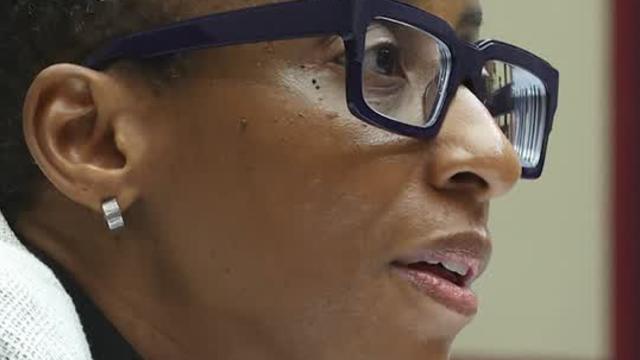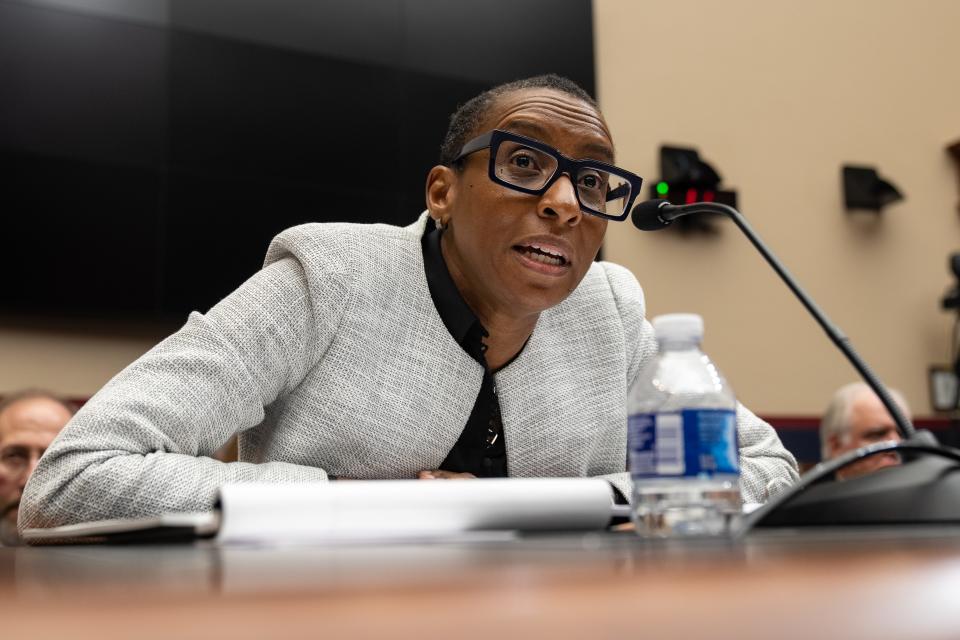Embattled Harvard President Claudine Gay resigns just six months into her tenure

Harvard President Claudine Gay announced her resignation Tuesday following accusations of plagiarism in her academic work and a grilling by congressional lawmakers in early December over her response to antisemitism on her campus since the start of the Israel-Hamas war.
"This is not a decision I came to easily," Gay wrote in a statement. "But, after consultation with members of the (Harvard) Corporation, it has become clear that it is in the best interests of Harvard for me to resign so that our community can navigate this moment of extraordinary challenge with a focus on the institution rather than any individual."
Gay, Harvard’s first Black president, had only stepped into the role over the summer. But she resigned just six months into her tenure, the shortest of any president in Harvard history.
The announcement came after Gay faced a wave of criticism for lifting passages without the proper citations in several academic papers she wrote years ago.
Gay wrote it was "distressing to have doubt cast on my commitments to confronting hate and to upholding scholarly rigor … and frightening to be subjected to personal attacks and threats fueled by racial animus."
The Harvard Corporation wrote in its own statement: "While President Gay has acknowledged missteps and has taken responsibility for them, it is also true that she has shown remarkable resilience in the face of deeply personal and sustained attacks."
The attacks, the Corporation wrote, took the form of "repugnant and in some cases racist vitriol directed at her through disgraceful emails and phone calls."
Alan M. Garber, the university's provost and chief academic officer, will serve as interim president, according to the Corporation's statement.
Elise Stefanik calls Gay's resignation 'long overdue'
New York Republican Rep. Elise Stefanik, whose questioning of Gay, University of Pennsylvania President Liz Magill and Massachusetts Institute of Technology President Sally Kornbluth during the December hearing became a viral video on social media, wrote in a statement, "The resignation of Harvard’s antisemitic plagiarist president is long overdue."
"Claudine Gay’s morally bankrupt answers to my questions made history as the most viewed Congressional testimony in the history of the U.S. Congress," she wrote.
Stefanik also tweeted to "stay tuned" for resignations of members of the Harvard Corporation Board.
"They are complicit in covering up this massive scandal with unbelievable arrogance and cavalier attitudes that irreparably damaged @Harvard’s academic integrity and moral leadership," she wrote.
'Why should the Jewish community demand any less?'
Ron Halber, the Executive Director of the Jewish Community Relations Council of Greater Washington, told USA TODAY he believes Gay "should have resigned immediately" after her congressional testimony.
"I think other university presidents around the country really have to understand that there is a point where speech can have incredibly adverse effects in creating an environment where students of different backgrounds can literally feel physically intimidated," Halber said.
Halber added: "We wouldn't accept it for any other group. Why should the Jewish community demand any less?"
Halber also called the Harvard Corporation's response to Gay's resignation "a lost opportunity to condemn antisemitism."
"Her failure to initially denounce antisemitism unequivocally and unapologetically, combined with these allegations of plagiarism, is probably what made it impossible for her to stay on," Halber said.
Board first stood by Harvard president
Following outrage sparked by her congressional testimony, Harvard's board released a statement reaffirming its support for Gay's leadership, writing that "in this tumultuous and difficult time, we unanimously stand in support of President Gay."
Gay, 53, received her Ph.D. from Harvard in 1998, and her dissertation won the Toppan Prize for best dissertation in political science.
More recent concerns of academic plagiarism first were presented to Harvard through a query from the New York Post, which had shared an anonymous allegation. Gay asked the Harvard Corporation to investigate, and it in turn created a subcommittee to look into the allegations.
After a review, Harvard said in late December that it found no evidence of "intentional deception or recklessness" in her work, but it did find several instances that failed to adhere to the Harvard Guide for Using Sources that were regrettable.
Gay submitted requests to the board for corrections to two articles she wrote in 2001 and 2017 in which the subcommittee's review found several "instances of inadequate citation."

In addition, Harvard received anonymous complaints involving Gay's dissertation. Following its review, it granted her request to add citations or quotations in three places in her 1997 dissertation.
Gay, Harvard's 30th president, ascended to the position in June 2023 after serving as Harvard’s Faculty of Arts and Sciences since 2018, according to Harvard's website. The first person of color and second woman to serve as Harvard's president, Gay first came to the university in 2006 as a professor of government.
GOP targets higher ed: Plagiarism claims against Harvard's president boost effort
Calls for resignation came after explosive testimony before Congress
Questions about whether Gay copied others' work first became public after the December congressional hearing, when she and other elite university presidents were excoriated for their responses to questions about whether calling for the genocide of Jews would violate campus policies on bullying and harassment.
In a letter sent to the Harvard Corporation on Dec. 20, Rep. Virginia Foxx, chairwoman of the House Education and the Workforce Committee before which the presidents testified, announced it would begin a review of Harvard's handling of the plagiarism accusations. "Our concern is that standards are not being applied consistently, resulting in different rules for different members of the academic community," Foxx wrote.
The letter threatened that federal funding to the university is "conditioned" on its adherence to accreditation standards that require educational institutions to work "to prevent cheating and plagiarism as well as to deal forthrightly with any instances in which they occur.”
The committee summoned Gay, along with the presidents of the University of Pennsylvania and MIT, to testify at a hearing in early December dedicated to "holding campus leaders accountable and confronting antisemitism."
During the hearing, Stefanik grilled the three presidents on their response to "antisemitic rhetoric." Asked whether calling for the genocide of Jews violated Harvard's bullying and harassment rules, Gay did not respond with a simple "yes," but instead said, "when it crosses into conduct, that amounts to bullying, harassment, intimidation, that is actionable conduct, and we do take action."
Stefanik's pointed questions quickly went viral on social media.
In response, a bipartisan group of lawmakers called for her ouster, as did prominent and wealthy alumni. Stefanik announced investigations of Harvard, MIT and Penn the same week.
Gay tried to be more emphatic about her stance after the furor grew.
“There are some who have confused a right to free expression with the idea that Harvard will condone calls for violence against Jewish students,” she said in a statement posted on the social media platform X the day after the hearing. “Let me be clear: Calls for violence or genocide against the Jewish community, or any religious or ethnic group are vile, they have no place at Harvard, and those who threaten our Jewish students will be held to account.”
Gay then further tried to stem the damage in an interview with The Crimson.
“I am sorry,” she told reporters on Dec. 8. “Words matter.”
Harvard leader questioned: Congress presses president about handling antisemitism
Civil rights leaders, academics lament Gay's resignation
Following the Tuesday announcement, various groups issued statements speaking out against the circumstances that led to Gay's decision to step down.
Emmitt Y. Riley, president of the National Conference of Black Political Scientists, highlighted the "profound sense of sorrow, disappointment, and, at times, anger" that the group's members feel over Gay's resignation.
"It is imperative that we confront the reality that these attacks and the targeting of Dr. Claudine Gay are firmly rooted in anti-blackness and racism," he said. "These attacks are not just an affront to Dr. Claudine Gay as an individual; they represent a direct assault on the very core of our work, the scholarship we produce, and our aspirations to advance in higher education. What we are witnessing is a sobering demonstration that none of us are exempt from the pernicious influence of the white supremacist movement that pervades not only the United States but also the global stage."
Black political scientists, Riley stressed, should continue researching and writing about racial justice and liberation. They should also persevere in their efforts to improve DEI on campus, he continued.
Rev. Al Sharpton, who amid last month's fallout defended Gay, highlighted the racial implications of the news. "President Gay’s resignation is about more than a person or a single incident," said Sharpton, a prominent civil rights activist and the founder and president of the National Action Network. "This is an attack on every Black woman in this country who’s put a crack in the glass ceiling. It’s an assault on the health, strength, and future of diversity, equity, and inclusion – at a time when Corporate America is trying to back out of billions of dollars in commitments."
Sharpton's statement specifically lambasted Bill Ackman, the billionaire hedge fund manager who's led calls for the resignation of Gay and some other elite college presidents over their response to Israel-Hamas tensions on campus. "Most of all, this was the result of Bill Ackman’s relentless campaign against President Gay, not because of her leadership or credentials but because he felt she was a DEI hire," he said in his statement.
On Thursday, the National Action Network will picket outside Ackman's office.
Shortly after the news broke Tuesday, Ackman posted a three-word tweet: "Et tu Sally?" The tweet is presumably meant to shift resignation pressures to MIT's president, who remains in her post after testifying in December.
University of Pennsylvania president also exited post
Gay joins Magill, who stepped down in December, in exiting her post since the congressional hearing.
Despite the uproar, petitions in support of Gay’s presidency, including one by 700 faculty and another from Black faculty, also circulated.
“The suggestion that she would not stand boldly against manifestations of antisemitism and any suggestion that her selection as president was the result of a process that elevated an unqualified person based on considerations of race and gender are specious and politically motivated,” the petition by Black faculty reads.
Harvard's most prominent alumni group also unanimously backed Gay in a letter sent to the university's governing boards after the hearing, according to a copy of the letter provided by the university to USA TODAY. Harvard and Penn, though both members of the Ivy League athletic conference, have significantly different financial resources, and therefore different relationships with – and reliance upon – their alumni. Harvard, for instance, is the wealthiest university in the U.S., with a roughly $50 billion endowment. Penn, on the other hand, has an endowment of less than half that size.
And their population of Jewish students is different too. According to the most recent estimates from the Jewish student group Hillel, the amount of Jewish undergraduates at Harvard is less than half of the number enrolled at Penn.
This article originally appeared on USA TODAY: Claudine Gay resigns as Harvard president just six months into tenure
Solve the daily Crossword

